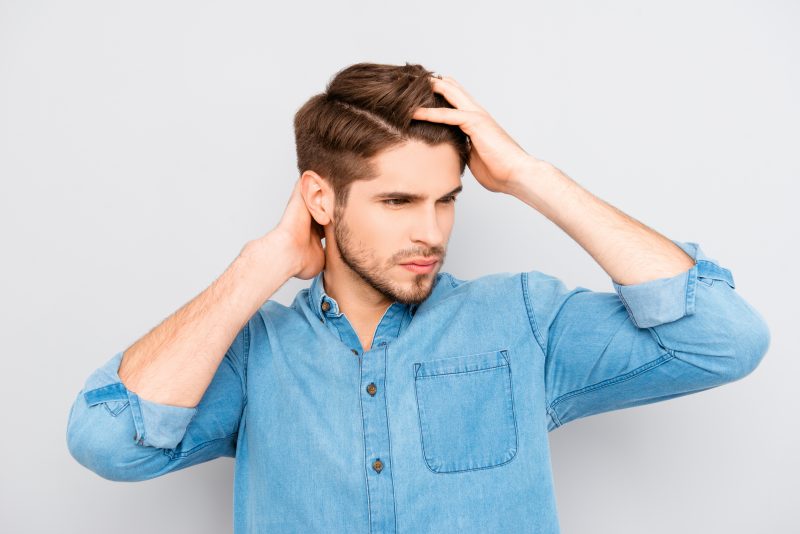You see ugly flakes on your shoulders and in your hair – is it dry scalp or dandruff?
Both dandruff and dry scalp cause embarrassing flakes to shed in your hair and on your clothes, but each is caused by different factors and requires a different treatment.
So, when you spot those first flakes, how can you tell if it’s dry scalp or dandruff? Here are the main differences between these two annoying scalp conditions.
What is Dandruff?
Despite popular belief, dandruff is not caused by dry skin. Dandruff flakes are actually dead skin cells that have sloughed off the scalp.
Dandruff is a scalp condition caused by a common and harmless fungus that lives on most people’s scalps called Malassezia. In some people, the body reacts to this yeast by overproducing skin cells. As the skin cells shed, they appear as dandruff flakes.
Genetics, stress and a compromised immune system can make some people more predisposed to developing dandruff. Those with seborrheic dermatitis on other areas of the body are also at a greater risk of dandruff. This red, itchy and flaky rash looks like eczema or psoriasis and can also appear on your scalp. Sometimes, dandruff is even a reaction to certain shampoos and other hair products.
Dandruff causes the scalp to itch and flake. These flakes of skin can be small and white but are more often larger, greasy and a yellow or grayish color. Sometimes, dandruff also has a distinct smell. These flakes can pop up on the scalp, in beards, on eyebrows or even on the nose, chest or back.
Treating Dandruff
Dandruff is a condition that can be diagnosed definitively by your dermatologist. Preventing dandruff starts with keeping a healthy scalp and clean hair. Taking a break from styling products such as hair gels and hair sprays that can cause build-up on the scalp can also help prevent dandruff.
“There are a number of over-the-counter shampoos designed specifically to combat dandruff, and most are effective,” says Dr. Thomas. “Washing your hair every day and at least three to five times a week with a dandruff shampoo can really help.”
For the best results, brush any crusty patches from your scalp before using a dandruff shampoo, and leave the product on for several minutes before rinsing. This gives the treatment more time on the scalp to work. If over-the-counter products do not clear your dandruff, your dermatologist can prescribe a medicated shampoo.
In some cases, exposure to the sun has also shown to help improve and prevent dandruff symptoms.
What is Dry Scalp?
A dry scalp is just that: a scalp that lacks sufficient moisture. Dandruff is a very common condition, but a dry scalp is rare because the scalp is naturally very oily, and hair helps to retain the scalp’s moisture.
If your scalp is dry, chances are that you suffer from dry skin on other parts of your body. Dry scalp is typically caused by overall dehydration or poor diet. Excessive use of hair products can also irritate the scalp and cause it to itch and flake.
Other conditions such as seborrheic dermatitis, psoriasis and eczema can also cause itchy, flaky scalp. When scratched, small flakes of skin can shed, but these flakes are not considered dandruff.
Treating Dry Scalp
“Dry scalp is more common in people who have dry skin overall, and it can typically be treated with moisturizing shampoos and conditioners,” says Dr. Thomas.
If nourishing shampoos and deep conditioners don’t do the trick, try a clarifying shampoo to rid the scalp and hair of any product build-up, or try switching to another brand and type of shampoo. Shampoo your hair with warm water, as frequently washing with hot water can further dry out your hair and scalp.
Over-the-counter hot oil treatments can also be effective at replacing the scalp’s natural oils and retaining moisture. These treatments can be applied to the scalp and gently massaged in to soothe itchy, dry skin.
If dehydration is the root cause of your dry scalp, remember to drink plenty of water and introduce more vitamins into your diet by eating fruits, vegetables, and whole grains. Processed foods high in sugar can contribute to an unhealthy scalp and skin.
If none of these treatments successfully improve your symptoms, call your dermatologist. A professional exam can rule out more serious conditions.
Looking to Visit a Dermatologist for Dandruff?
Are you suffering from dry scalp, dandruff or another irritating skin condition that isn’t responding to over-the-counter treatments? Our board-certified dermatologists at U.S. Dermatology Partners can help. We have multiple locations throughout the country, so fill out our simple online form to get in touch with us. One of our local team members will reach out to you shortly to answer your questions or schedule an appointment for you to visit us soon.
Find a location near me
or

